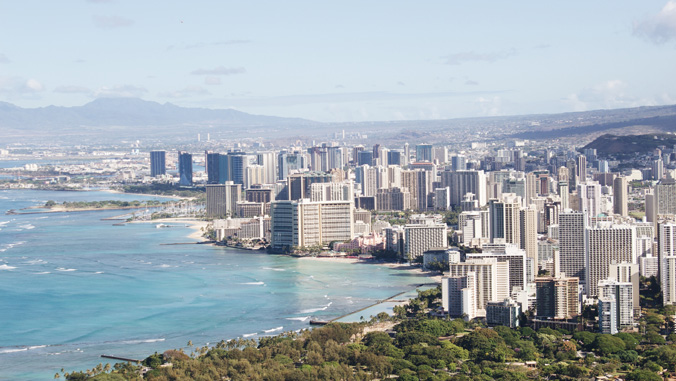
If all short-term vacation rentals (STRs) were eliminated on Oʻahu, home prices could drop by as much as 6% and rents may fall by as much as 8%, according to a new blog by University of Hawaiʻi Economic Research Organization (UHERO) experts.
Of the state’s 565,000 total housing units, 30,000 are listed as STRs, meaning roughly 5% of local housing units operate as tourist accommodations. In a tight housing market with high prices and barriers to creating new supply, removing supply from the long-term housing market could harm residents by raising housing costs.
Short-term vacation rental impacts
Using findings from studies that estimated the effects of STRs on home prices in other cities, UHERO experts Rachel Inafuku and Justin Tyndall estimated the likely housing cost impact of STRs in Oʻahu. A Barcelona study comparing STR activity near and far from tourist attractions found that adding 50 STRs to a neighborhood increased rents by 2% and home prices by 5%, with larger effects in the most touristy areas. A study from Los Angeles showed that reducing Airbnbs by 50% led to a 2% reduction in home prices and rents. A study of London found that a doubling of the Airbnb stock led to an 8% increase in rents.
Borrowing findings from the three studies, Inafuku and Tyndall estimated the effect STRs have had on local rents and home prices on Oʻahu (researchers focused on Oʻahu only because the prevalence of STRs is not dramatically different from Barcelona, Los Angeles and London). Looking at median home prices, estimates from the Los Angeles and Barcelona studies imply that, in the absence of all STRs, prices on Oʻahu would be 4–6% lower than they are currently. The median sale price across all housing units on Oʻahu (house or condominium) in 2022 was $860,000. Based on the estimated price effects from these studies, removing all STRs would push the median price down to the $810–$820,000 range.
As for rents, there is a slightly wider range of estimates. The Los Angeles study implies that eliminating all STRs would decrease Oʻahu’s rents by 2%. Estimates from Barcelona suggest a 6% drop and estimates from London suggest an 8% drop. The median rent paid on Oʻahu is currently $1,880. According to prior studies, removing all STRs could lower the median monthly rent by anywhere from $35 to $160.
If these price reductions were realized, experts say Oʻahu would still suffer from extremely high home prices. Oʻahu’s median home price would still exceed the median price of any state in the U.S. However, the roughly 5% reduction in housing costs would represent a sizable improvement in the standard of living for renters and first-time home buyers, particularly lower-income residents for whom housing costs represent a large share of overall expenses.
“There is evidence from other markets that STRs increase both home prices and rents,” according to the UHERO blog. “In Hawaiʻi, STRs play a truly outsized role in the housing market compared to other locations. While far from a silver bullet to address the state’s housing shortage, the scale of the market suggests that changes to the regulatory environment around STRs would have significant consequences for the housing market.”
Rise of short-term vacation rentals
The founding of Airbnb in 2008 made it possible to convert housing stock into visitor accommodations with minimal effort and cost. Many other online platforms have since begun offering similar services to facilitate STRs. The impact of these services on the housing market has been a topic of concern for many cities, particularly tourist destinations with high housing costs. With the highest housing costs in the nation, Hawaiʻi fits that description.
In Hawaiʻi, 82% of STRs are posted on Airbnb. U.S. cities that have been particularly concerned with the rise of STRs include San Francisco, where 1.4% of housing units are Airbnbs, New York City (0.6%) and Las Vegas (0.6%). In Hawaiʻi, the situation is relatively extreme. The share of the state’s housing stock posted on Airbnb is 4.7%, more than three times higher than San Francisco and more than seven times higher than New York City. On the neighbor islands, the rates are higher. Maui County has 12% of all housing units listed on Airbnb and on Kauaʻi the figure is 14%.
UHERO is housed in UH Mānoa’s College of Social Sciences.

